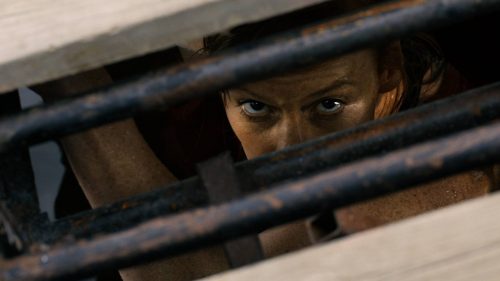LA Film Fest 2016: Blood Stripe, by David Bax
Remy Auberjonois’ gripping and somber Blood Stripe announces a number of talents from whom we can hope to expect more great things in the future. The first is Auberjonois himself, a well-established character actor making his debut as both director and screenwriter. Even more impressive, though, is his co-writer and star, Kate Nowlin whose intense and empathetic screen presence gives us what may be the best physical and emotional performance of the year so far.
Nowlin plays a marine who has just returned home to Minnesota from either Afghanistan or Iraq (we know that she’s done tours in both but the film is deliberately vague about her most recent experiences). We never learn her name; she’s referred to mostly as Sarge. Almost immediately, it’s clear that her readjustment is not going well. She vomits her first night back, starts a fight at her welcome home party and drinks constantly. Seemingly on a whim, she takes a drive north, into the woods and the summer camp she attended as a girl. It’s autumn and the camp is out of season but it turns out the owner, Dot (Rusty Schwimmer, terrific) could use some help around the property. A church group, led by a kind and openhearted man named Art (Rene Auberjonois, the director’s father) has reserved the place for a retreat.
At first, the hard work of cleaning and mending seems to improve Sarge’s mental stability. Soon, though, whatever is plaguing her burns through that temporary distraction like corrosive acid. Blood Stripe never diagnoses its protagonist with post-traumatic stress disorder nor does it pinpoint a cause. There are no flashbacks to her wartime experiences. Only by hints, such as her apparent unease around some men, are we able to infer anything at all. Auberjonois and Nowlin aren’t interested in a PTSD case study procedural so much as they are in presenting a personal and somewhat impressionistic account of what it may be like to live with the affliction, such as Sarge’s repeatedly seeing blood (on herself and elsewhere) that most likely isn’t actually there.
Radium Cheung’s note-perfect cinematography aids in the film’s attempts to get us inside Sarge’s head. His subjective camera follows her through thick and thin, while his earthy color palette lends tactility. Auberjonois mostly favors a patient and grounded editing cadence but occasionally allows disorienting, scattershot bits of out of context close-ups to emulate Sarge’s distress.
Sarge grows increasingly paranoid over the course of the film, at times acting on her volatile distrust of some local men (whose douchey menace is hilarious announced by their taste for late-period Metallica). But these men, creeps or not, aren’t her enemy. The tragic cruelty of her disease is that the enemy is already inside her. Blood Stripe illustrates this with the clear eyes of a docudrama and the queasy tension of the thriller genre.





























